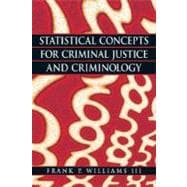
Frank P. Williams III has been in the criminal justice academic field since 1976 (Ph.D., Criminology, Florida State University). He is currently a Professor in the Department of Criminal Justice, University of Houston-Downtown and is also Professor Emeritus at the California State University, San Bernardino. He has taught at doctoral, masters and undergraduate levels and held positions as department chair, research director, and program coordinator. His academic credentials include numerous publications and research projects, editor or deputy/associate editor for several journals and publishers’ book and monograph series and office/service on boards of several scholarly organizations. Most recent publications include Imagining Criminology, an encyclopedia, and journal articles or book chapters on drug use, gangs, processing of females in the criminal justice system, and parolee recidivism, most of which are coauthored with Marilyn D. McShane. His more than 30 years of experience in teaching statistics spans the range from introductory undergraduate to advanced doctoral level.
| Foundations of Statistics | |
| Introduction to Statistics | |
| Levels of Measurement | |
| Describing Single Variables | |
| Describing Variables: Graphical Statistics | |
| Describing Variables: Measures of Central Tendency | |
| Describing Variables: Measures of Dispersion | |
| Describing Variables: Curves and Distributions | |
| Describing Variables: Frequency Distributions | |
| Testing for Bivariate Relationships | |
| Elementary Relationships: Crosstabulation Tables | |
| Hypotheses and Sampling Distributions | |
| Statistical Significance | |
| Testing for Significance: The Chi-Square Test | |
| Testing for Significance in Two Groups: The T-Test | |
| Testing for Significance in Multiple Groups: The Analysis of Variance | |
| Determining the Strength of Relationships | |
| The Concept of Association | |
| Testing for Association: Phi | |
| Testing for Association: Pearsonrsquo;s R and Regression | |
| Doing Real Research: Elementary Multivariate Relationships | |
| Box Plots | |
| Determining normality: Skewness and Kurtosis | |
| Ordinal Level Tests of Significance: The Mann-Whitney U-Test and the Kruskal-Wallis Analysis of Variance | |
| Choosing a Multiple Comparison Test | |
| Nominal Level Tests of Association: Lambda and the Uncertainty Coefficient | |
| Ordinal Level Tests of Association: Gamma and Somerrsquo;s D | |
| Table of Contents provided by Publisher. All Rights Reserved. |
The New copy of this book will include any supplemental materials advertised. Please check the title of the book to determine if it should include any access cards, study guides, lab manuals, CDs, etc.
The Used, Rental and eBook copies of this book are not guaranteed to include any supplemental materials. Typically, only the book itself is included. This is true even if the title states it includes any access cards, study guides, lab manuals, CDs, etc.